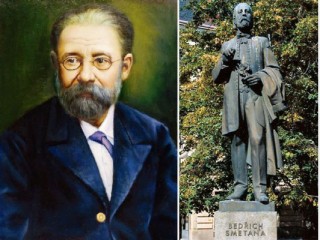
Bedrich Smetana biography
Date of birth : 1824-03-02
Date of death : 1884-05-12
Birthplace : Litomyšl, Prague, Czech Republic
Nationality : Czech
Category : Famous Figures
Last modified : 2011-01-06
Credited as : Composer, conductor of the Philharmonic Society of Goteborg,
The Czech composer Bedřich Smetana, founder of Bohemian national music, is most known for his symphonic poems and operas. His music combines a strong symphonic technique with melodic and rhythmic ideas derived from Bohemian folk traditions.
Born into a large family in the small town of Leitomischel, Bedřich Smetana showed exceptional musical talent as a child, performing on the violin and piano at the age of 5 and writing his first compositions at 8. Despite his father's opposition to his musical training, he quickly gained a reputation as a pianist through his performances of the works of Franz Liszt. After moving to Prague in 1844, Smetana became music teacher to the family of the wealthy Count Thun but left after 4 years. With the help of Liszt, Smetana founded his own piano school.
In 1856 Smetana accepted a position as conductor of the Philharmonic Society of Goteborg, Sweden. While there he wrote his first important symphonic poems, including Wallenstein's Camp (1859) after Friedrich von Schiller's great dramatic trilogy. During this time, events were changing in Bohemia. Austria, weakened from futile attempts to maintain control over Italy, granted Bohemia political autonomy in 1860, which elicited strong national feelings from the Bohemians. The following year Smetana returned to Prague to become a leader in the new movement, the first substantial result of which was the establishment in 1862 of a theater where opera and drama could be presented in the Czech language.
Smetana's first major operatic success, The Bartered Bride (1866), instantly raised him to the status of Bohemia's leading composer and won for him international success as well as the position as first conductor of the Prague theater. The opera, a humorous tale of peasant life, is full of dance sequences based on Bohemian folk rhythms. The overture, polka, and furiant are often heard in concert. His next opera, Dalibor (1868), was more serious, with the hero conceived as a symbol of the Czech soul. Smetana's symphonic orchestration upset some critics, who accused him of imitating Richard Wagner, and throughout his life his serious operas were attacked by many who preferred his lighter works. Today Dalibor is considered one of the greatest Czech operas, although it is virtually unknown outside its own country.
Eventually Smetana developed a nervous disorder, continually hearing noises in his head and at times suffering memory lapses. In 1874 he was forced to resign from his conducting position, and at the end of that year he became permanently deaf. From 1874 to 1879 he occupied himself with the composition of a cycle of six symphonic poems titled My Country, of which the best-known are The Moldau (1874) and From Bohemia's Meadows and Forests (1875). In 1876 he completed his most important chamber work, the string quartet From My Life. This composition is unique in the repertoire because of its autobiographical subject matter, reflected in the harrowing screech in the high violin that interupts the dance in the last movement, representing Smetana's own physical disability. In the spring of 1884 he was committed to a mental institution, where he died a few months later.
Two important biographies of Smetana are Liam Nolan and Joseph Bernard Hutton, The Life of Smetana: The Pain and the Glory (1968), and Brian Large, Smetana (1970), the last of which contains musical analysis as well as biographical material. For general background see Donald Jay Grout, A History of Western Music (1960), and Kenneth B. Klaus, The Romantic Period in Music (1970).
















